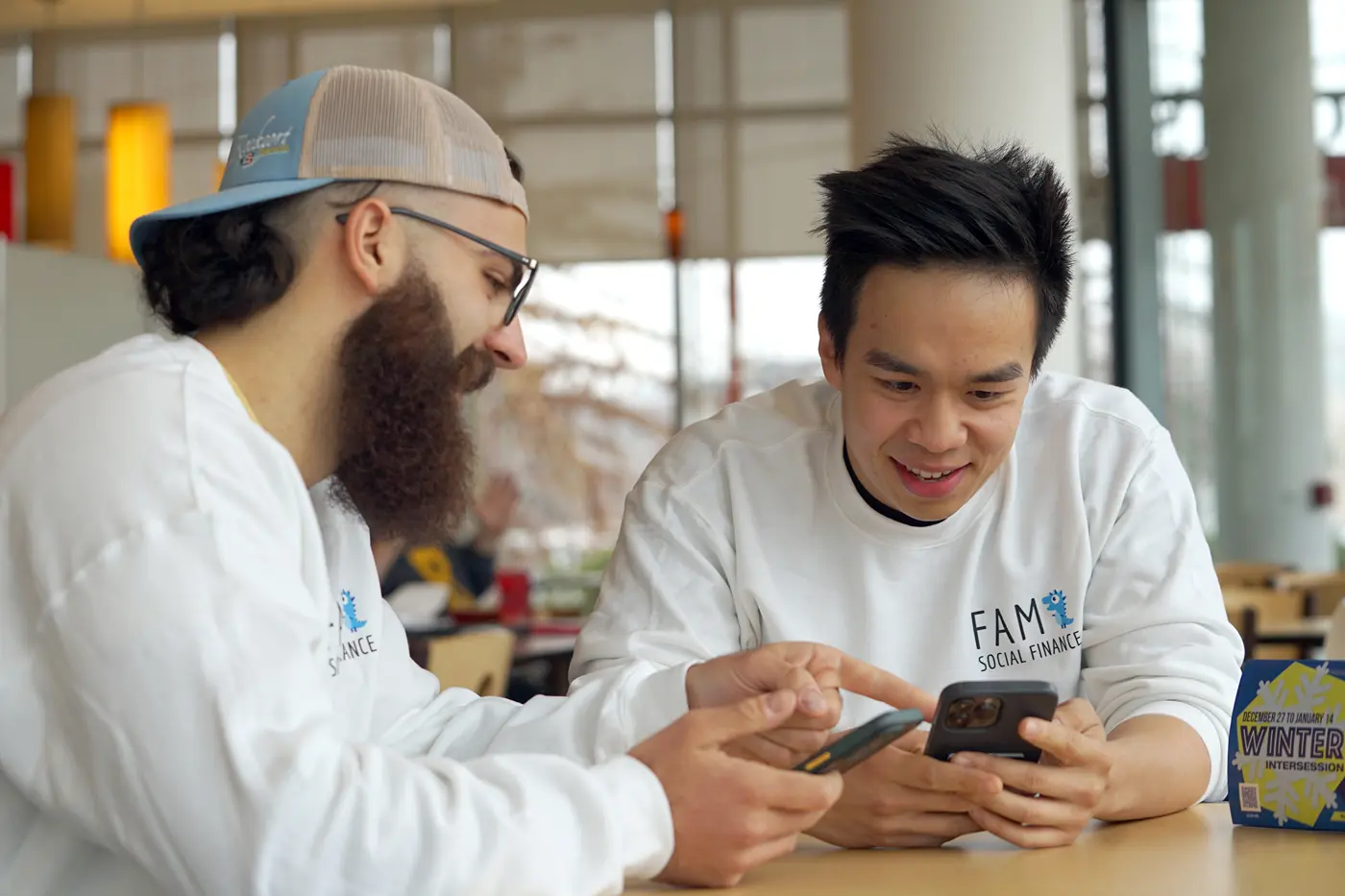 Image by Ed Brennen
Image by Ed Brennen
Business alum Louis Cirignano '20, left, and computer science alum Khyteang Lim '16, '18 discuss their FAM Social Finance app during a recent visit to campus.
Spring break is just around the corner, and an estimated 1.5 million U.S. college students — including many from UMass Lowell — will be heading to warm and sunny locales like Florida, Mexico and the Caribbean.
With the average spring break trip costing over $1,000, many students take on debt to pay for their getaways. According to a LendingTree survey, 25% of students put their trip on a credit card.
Three UMass Lowell alumni — Louis Cirignano ’20, Khyteang Lim ’16, ’18 and Tatiana Tompkins ’21 — want to help students enjoy spring break without breaking the bank. They recently launched FAM Social Finance, an app that uses generative artificial intelligence to help people save money for vacations and other major expenses such as a wedding, a new car or even a home.
“It’s scary the percentage of young adults, especially Gen Z’s, that debt-finance trips,” says Cirignano, a Manning School of Business alum who found that those who do so accrue an average of $5,000 in travel debt each year. “You’re going on vacation to escape some of the stresses of life, and you’re digging a deeper financial hole as you go.”
 Image by courtesy
Image by courtesy
Economics alumna Tatiana Tompkins '21 is manager of business development for FAM Social Finance. She also runs her own business, 3T Consulting.
“It’s a budgeting app for people who don’t like budgeting apps. It’s savings tracking to make sure that you have the funds that you need,” says Cirignano, who plans to integrate banking with the app so that users can deposit money directly into high-yield savings accounts.
Cirignano, whose concentrations were in entrepreneurship and finance, started FAM during his junior year at UML, when he pitched it at the Rist DifferenceMaker Innovation Contest. He has continued to develop and beta-test the app, supported by his work in real estate sales in his hometown of Winchester, Massachusetts.
Lim and Tompkins both met Cirignano at UML and joined FAM along the way. Lim, a computer science alum from Lowell, is the company’s chief technology officer; Tompkins, an economics alumna from Andover, Massachusetts, is manager of business development. The team also includes Creative Media Director Alicia Gibney.
Lim participated in the DifferenceMaker program and several product design hackathons at UML, which sparked an interest in entrepreneurship. He has since founded two AI-integrated startup companies: Waldo Labs, a recruiting platform that he sold last year, and Indie Space, which uses AI to generate executable business plans for entrepreneurs.
 Image by Ed Brennen
Image by Ed Brennen
The FAM Social Finance app is available from the Apple App Store and Google Play.
Lim is also a software engineer at Caire, an AI-powered patient engagement platform for health care providers. While he is immersed in AI technology, he is concerned about how it is disrupting the workforce.
“I don’t know if the world is ready for this quick of a change,” he says.
Tompkins, who joined FAM in 2022, also runs her own business, 3T Consulting in Andover. She is responsible for FAM’s go-to-market strategy and marketing, as well as developing partnerships with banks and other channels. FAM recently announced its first partnership with an AI-powered language learning platform called Kansei.
“If you’re planning a vacation to Spain and want to learn some Spanish ahead of time, you can take advantage of Kansei while you’re using FAM to save for your trip,” she says.
Tompkins, who also participated in DifferenceMakers at UML, understands the pressure that college students feel to go away for spring break, especially when they see what others are doing on social media.
 Image by Ed Brennen
Image by Ed Brennen
"One thing I love about UMass Lowell is the scope of connections you make here," says Khyteang Lim '16, '18, right, who met FAM Social Finance founder Louis Cirignano '20, left, through a mutual friend at the university.
“It’s something they’re going to do regardless, because they have that fear of missing out. They don’t want to be the one sitting at home when everyone is on vacation doing great things,” she says. “We want to support these students by helping them save for their trip in a methodical way.”
FAM features a social component of its own, as users can create groups to discuss destinations and ask questions of fellow travelers such as, “What’s the best time of year to visit Thailand?”
“Travel is an uplifting topic that’s easy for people to discuss,” says Cirignano, who hopes that users will also become comfortable talking about “heavier” subjects such as getting out of credit card debt. “The social side of the app is there to help break down the stigmas and have transparent conversations around these topics.”
The bottom line, Cirignano says, is that the difference between saving for a trip for a year versus paying it off for a year on a credit card is nearly $1,000.
“You feel a lot better about the trip and feel more accomplished in the fact that you’ve prepaid for it,” he says. “You can actually relax and enjoy yourself.”
